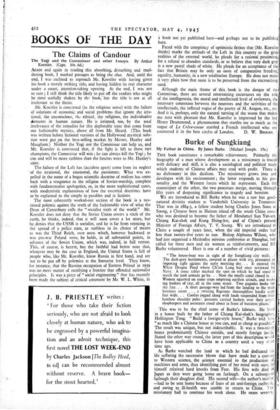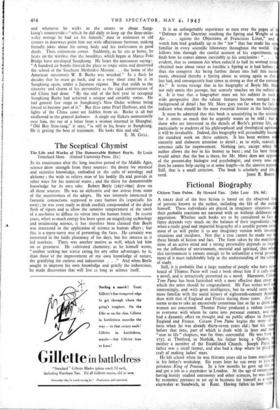Burke of Sungkiang
•
My Father in China. By James Burke. (Michael Joseph. 15s.) Tins book constitutes a remarkable achievement. Primarily the biography of a man whose development as a missionary is traced with delicacy and skill, it is also a sociological and political study- which students of Chinese affairs may read with profit. There is no dichotomy in this dualism. The missionary grows into and developes with his environment ; the latter responds .to his per- sonality. and the Western forces which he represents. Each thq counterpart of the other, the two processes merge, moving through
fifty years of deepening significance to tragedy and heroism. , We are introduced to Bill Burke when he was a raw but good- natured divinity student at Vanderbilt University in Tennessee. That was in 1884-5, a fellow student being Charles Jones Soon or Soong, a Chinese born in Hainan island off the south China coast, who was destined to become the father of MesdameS Sun Yat-sen, Chiang Kai-shek and Kung Hsing-hsi, and of China's present Minister of Foreign Affairs, T. V. Soong. We are introduced to China a couple of years later, when the old imperial order had less than twenty-five years to run. Bishop Alphaeus Wilson, who had just organised a Methodist mission conference at Shanghai, had called for three men and six women as reinforcements, and Bill Burke volunteered. Here is one of a number of vivid pictures:
" The house-boat was in sight of the Sungkiang city walls.: The dark-grey battlements, covered in places with ivy, presented an imposing sight against the early morning sky. . . It entered the White Dragon Pond where Ch'ien Lung had once reviewed hii Navy. A stone tablet marked the spot on which he had stood to watch the junk armada go by. . . Now the smelly, canal closed in. . . Women squatted on stone steps emptying earthen urinals, and wash, ing baskets of rice, all in the same water. Two pagodas broke the sky line. . . A short passage-way led from the landing to the main business street . . . a twisting flagstone thoroughfare hardly eight, feet wide. . . Coolies jogged along with loads suspended from their bamboo shoulder poles: peasants carried baskets over their arms: shopkeepers and assistants stood about in front of business' places.-
• This was to be the chief scene of Burke's labours.. He lived in a house built by the father of Chiang Kai-shek's biographer,
Hollington Tong. Build a foreign-style house," Burke told hi. • " as much hie a Chinese house as you can, and as cheap as possible.": The result was unique, but not indescribable. It was a two-storeg house predominantly Chinese outside,• and mostly foreign inside. Stated the other way round, the latter part of this description would have been applicable to China as a country until a very si-,Jrt time ago.
As Burke watched the land to which he had dedicated his life suffering the successive blows that have made her a convert to Western science, the science essential to the production of machines and arms, thus identifying part of her mind with ours, he himself reZeived hard knocks from Fate. His first wife died it! Japan as they were going home on furlough. On a subsequent furlough their daughter died. His second wife—the author's mother —had. to be sent home because of fears of an anti-foreign, outbreak, and owing to. ill-health was unable to return to China. Tice missionary had to continue his work alone. He nears severity,
I
and whenever he walks in the streets or about Sung- kiang's countryside—" which he did-daily to keep up the three-mile- a-day average he had set for himself," men in teahouses or old cronies in doorways point him out with affectionate humour, making friendly jokes about his strong body and his tirelessness in good deeds. Then retirement comes. Suddenly, as he sits at home, he hears on the wireless that the hostilities which began at Marco Polo Bridge have enveloped Sungkiang. He hears the announcer saying : " A hundred air bombs blasted the place to tragic ruins and destroyed the school of the Southern Methodist Mission . . . the home of the American missionary W. B. Burke was wrecked." In a flash he decides that he must go back, -and in a very short time he is in Sungkiang again, under a Japanese regime. But that yields to the sincerity and charm of his personality as the rigid conservatism of old China had done. " By the end of the first year in occupied Sungkiang Burke had achieved a unique and enviable status. He had general free reign in Sungkiang's New Order without being forced to become part of it." But then came Pearl Harbour, and the lights of the China coast are hidden from us. Burke is all but swallowed in the general darkness A single ray flickers momentarily over him, the ray of a letter from a woman interned in Shanghai. " Old Boo Sien-sang," it says, " is still in his house at Sungkiang. He is getting the best of treatment. He looks thin and old."
E. M. Gum...



























 Previous page
Previous page